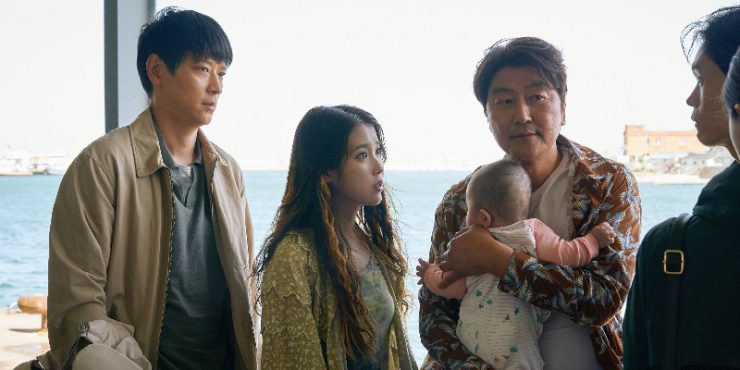Hirokazu Kore-eda’s uber-humanist approach to storytelling has produced some of the best films of the last twenty-five years, but his penchant for melodrama and sentimentality can sometimes lead him astray. His best films (like After Life or Still Walking) keep their narratives simple, and leave the complexity to the characters. There’s few filmmakers who have the sensitive touch to guide performances through emotionally difficult material like Kore-eda. There’s a lot of that in Broker, his latest film, and his follow-up to 2018’s Shoplifters, which won him a Palme D’or. Broker takes place in South Korea, and focuses on a group of people trying to sell a baby on the black market. In the ranks of Kore-eda’s unorthodox family units, this has to be amongst the most hard to fathom.
Song Kang-ho stars as Ha Sang-hyeon, the owner of a hand laundry whose main money-making enterprise is stealing abandoned babies from a nearby church to sell them to wealthy parents unable to conceive. His right-hand man is the younger Dong-soo (Gang Dong-won), himself an orphan who volunteers at the church. Dong-soo likes to rationalize their schemes with claims of finding proper homes for these babies, and keeping them out of the system that formed him. Sang-hyeon’s motivations seem solely based on money, as local gang sharks shake him down routinely in his laundry. When they get a new baby in the film’s opening scene, they’re shocked when its mother, So-young (Lee Ji-eun), returns days later and insists on helping them find the right parents – and taking a cut of the payment.
Details of So-young’s past are revealed later that explain why she’s so quick to give away a baby that she seems to have so much affection for, and these plot reveals at the halfway mark only add to the script’s chaos which clashes with Kore-eda’s minor key approach. A sub-plot involving two detectives (played by Bae Doona and Lee Joo-young) plays out in the periphery, allowing Broker to add farsical comedy to its expanse of tonal contradictions. It would be enough to have these detectives (who hope to catch them in the act of selling So-young’s baby and make the arrest) play their roles, off-setting the severity of our main characters’ predicament, but Kore-eda also insists on making their backstories part of the tangled web that ensnares everyone in the film. For a movie with such fraught subject matter, its conclusion is almost shocking in its convenience.
Song Kang-ho won the Best Actor prize at this year’s Cannes Film Festival for his performance here, and his uncanny ability to weave between comedy and drama makes his performance the only one that can successfully handle Kore-eda’s teetering narrative. His performance in 2019’s Parasite was a not-insignificant part of that film’s breakthrough box office and Oscar success, and made his fame more international than it has ever been. Still, Broker is a film about human traffickers, and Kore-eda’s gift for empathy feels a bit misguided here, as our heroes are meant to learn lessons and grow through the process of selling a baby to the highest bidder. When one of the protagonists starts espousing explicitly anti-choice rhetoric, it became clear that Broker‘s themes and its screenplay weren’t always on the same page.
There are intimate moments in the film where the strength of Kore-eda’s vision shines through, and his handling of the performances proves that he can evoke strong emotional reaction even with characters that fail to make any narrative sense. Perhaps he saw the unsympathetic nature of these people as some kind of challenge, but outside of Song’s Sang-hyeon, these same characters still court the sympathy that Kore-eda is so good at evoking. Broker side-steps nearly all responsibility for confronting the gravity of his story’s ethical chasm, and instead leans on an appeal to pathos, giving us another makeshift family unit fighting against a corrupt system. The appeal isn’t a very good argument – to the degree that there’s an argument at all – and leaves the audience left to do their own avenging, a position that doesn’t usually portend toward an enjoyable watch.
Written and Directed by Hirokazu Kore-eda










